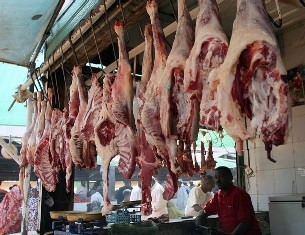Sudan blames rising food prices on low productivity and increased consumption
December 14, 2010 (KHARTOUM) – The Sudanese minister of finance and national economy Ali Mahmoud Hassanein said that recent sharp rises in the prices of grains and other basic foodstuffs is caused by low productivity and increased consumption, as ordinary citizens begin to feel the burden in their pockets.

Hassanein acknowledged that the government has no quick fix to the problem saying that this is a “complex matter” according to Sudan state media.
The Sudanese official stressed that the increase in consumption levels coupled with the decline in domestic production caused by high costs led to this situation.
He gave the example of sugar saying that its consumption in the years 2008-2009 was about 800,000 tons and 1,400,000 this year.
The independent Al-Sahafa newspaper gave a list of commodities that witnessed rising prices which included sugar sack that reached 160 Sudanese pounds (SDP) and flour sack selling at 160 SDP.
Prices of cooking oil jumped from 100 SDP to 110; Sesame oil from 110 SDP to 126; Cheese plate from 90 SDP to 120; Carton of noodles and macaroni from 21 SDP to 25; laundry soap from 10 SDP to 12.
Hassanein said that his ministry is currently working with economic and financial experts to provide solutions that would lead to higher rates of production in agriculture and industry and thus reduce the prices within a holistic framework of the economy within the next three years
He also complained about the misuse of foreign exchange in importing luxury commodities that is estimated in millions of dollars.
A number of merchants speaking to Al-Sahafa said that their sales volume have dropped as a result of the high prices and low liquidity in the hands of citizens. They also blamed the rising dollar versus the pound saying it led to higher import tab.
The government should reduce taxes and duties and encourage imports to ease inflationary pressures, they said.
(ST)

Lokeji
Sudan blames rising food prices on low productivity and increased consumption
The inbalance between production and consumption is not a recent problem but since.the government concentrated the entire countries economic on oil revenue which is variable.The government have to change country’s domestic economy, instead of relying on oil production let the government gears country’s domestic economy towards agricultural investment and try to encourage local farmer to form better and productive agricultural associations that will result to new economic revolution.